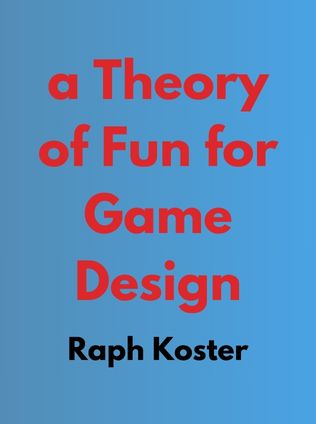
A Theory of Fun for Game Design
By Raph Koster
Published 11/2004
About the Author
Raph Koster is a pioneering figure in the world of game design, known for his profound contributions to both the practical and theoretical aspects of the industry. As the lead designer of the landmark game Ultima Online, Koster helped shape the modern online gaming landscape. His career is marked by a relentless curiosity about the nature of play and its role in human culture. This curiosity culminated in his influential book, "A Theory of Fun for Game Design," where he distills decades of experience and reflection into a cohesive framework for understanding what makes games truly enjoyable and impactful.
Koster's approach to game design is deeply informed by his interdisciplinary background. He draws on insights from psychology, education, art, and even evolutionary biology to explore the fundamental reasons why games captivate us. His belief that games are not just entertainment, but powerful tools for learning and personal growth, has inspired a generation of designers to think more critically about their work. Through "A Theory of Fun for Game Design," Koster invites readers to look beyond the surface of games and consider the deeper patterns and principles that make them fun and meaningful.
Main Idea
At the core of "A Theory of Fun for Game Design" is the idea that games are fundamentally about learning. Koster argues that the experience of fun is closely linked to the process of mastering new skills and concepts. This perspective challenges the conventional view of games as mere escapism and positions them as important vehicles for personal development. According to Koster, the joy we derive from games comes from the sense of accomplishment we feel when we solve problems, overcome challenges, and gain new understanding.
Koster's thesis is that the design of a game should focus on creating a compelling learning experience. He believes that by understanding the psychological mechanisms that drive fun, designers can create games that are not only enjoyable but also deeply educational. This approach has significant implications for the future of game design, suggesting that games can play a crucial role in education, socialization, and even personal transformation. By exploring the patterns of learning that games engage, Koster provides a blueprint for creating games that are both fun and meaningful.
Table of Contents
- Introduction
- Why Are Games Fun?
- What Do Games Teach?
- The Evolutionary Roots of Fun
- Games and Modern Skills
- The Future of Games as Art
- Conclusion
Introduction
The introduction of "A Theory of Fun for Game Design" sets the stage for Koster's exploration of the relationship between fun and learning. He begins by questioning the reasons behind humanity's deep-seated fascination with games. From ancient board games to the latest video games, humans have always been drawn to forms of play. Koster suggests that this attraction is not merely a matter of entertainment, but is rooted in our biology. The concept of fun, he argues, is closely tied to the brain's reward system, which motivates us to engage in activities that promote learning and skill acquisition.
Koster challenges the reader to reconsider the notion of games as trivial pastimes. Instead, he presents games as complex systems that engage our cognitive faculties in unique and powerful ways. The introduction serves as an invitation to explore the deeper meanings of play and to understand how games can be designed to maximize both enjoyment and educational value. By framing games as tools for learning, Koster sets the tone for the rest of the book, which delves into the specific mechanisms that make games fun and how these can be harnessed to create more meaningful gaming experiences.
Why Are Games Fun?
In the chapter "Why Are Games Fun?", Koster delves into the neurobiological underpinnings of fun, explaining that the sensation of fun is a byproduct of our brain's learning processes. He explains that fun is a psychological reward for mastering new skills or overcoming challenges. This insight is crucial for understanding why games are so compelling. According to Koster:
"Fun from games comes from learning, comprehension, and mastery." — Raph Koster
This quote encapsulates the essence of his argument. The enjoyment we derive from games is not random; it is a direct result of the cognitive processes involved in learning. When we play a game, we are essentially engaging in a structured form of problem-solving. Whether it's navigating a complex environment, strategizing against an opponent, or mastering a difficult task, the brain rewards us with feelings of pleasure when we succeed. This reward system is deeply rooted in our evolutionary history, as it encouraged behaviors that were essential for survival.
Koster also discusses the idea of flow, a state of deep immersion and focus that occurs when we are fully engaged in an activity. Games are particularly effective at inducing flow because they provide clear goals, immediate feedback, and a balance between challenge and skill. When a game is well-designed, it keeps the player in a state of flow by gradually increasing the difficulty level as the player's skills improve. This ensures that the player is constantly learning and being challenged, which keeps the experience fun and engaging.
Sign up for FREE and get access to 1,400+ books summaries.
You May Also Like
The Subtle Art of Not Giving a F*ck
A Counterintuitive Approach to Living a Good Life
By Mark MansonRich Dad Poor Dad
What the Rich Teach Their Kids About Money - That the Poor and Middle Class Do Not!
By Robert T. KiyosakiHow To Win Friends and Influence People
The All-Time Classic Manual Of People Skills
By Dale CarnegieFreakonomics
A Rogue Economist Explores the Hidden Side of Everything
By Steven D. Levitt and Stephen J. DubnerI Am Malala
The Story of the Girl Who Stood Up for Education and Was Shot by the Taliban
By Malala Yousafzai



















